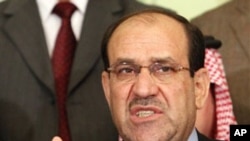Iranian media report Iraqi Prime Minister Nouri al-Maliki will visit Iran Monday as he trys to shore up support from Iranian leaders for his bid for a second term in office. Mr. Maliki visited Syria this past week for similar reasons, according to analysts.
Mr. Maliki's expected visit to Iran comes at a time when Iraqi political factions continue to maneuver behind the scenes, weighing whether to support him for a second term or not. Iraq has been without a government since an inconclusive parliamentary election last March.
Allies of Mr. Maliki indicate that he wants Iran to increase pressure on elements of the loose Shi'ite coalition called the National Alliance to cement his bid for a second term in office.
The prime minister is also seeking the support of other regional powers. He visited Syria last week and is expected to visit Turkey and Jordan in the coming days. In a speech Saturday, Mr. Maliki described his vision of an Iraq playing a key role in the region.
He says that Iraq possesses a vast wealth of human and material capital and should therefore play a pivotal role in the region. That role, he insists, should be a positive one, based on a relation of mutual benefit with neighboring countries.
Iranian TV announced Mr. Maliki's visit to Tehran, reporting that he would discuss the latest developments in Iraq with Iranian leaders.
Fars News Agency reported that Iraqi Interior Minister Jawad al-Bolani arrived in Tehran Friday to lay the groundwork for Mr. Maliki's visit. The agency added that Bolani would meet with his Iranian counterpart Mustafa Mohammad Najar to discuss border security and trade issues.
Iran scholar Houchang Hassanyari, who teaches political science at Canada's Royal Military College, says that Iran views Mr. Maliki as an ally and has intervened in his favor to secure the support of Shi'ite cleric Moqtada al-Sadr, who had opposed him.
"If it was not for the pressure of the Iranian authorities, Moqtada al-Sadr would not support him," he said. "So, there was a lot of arm-twisting in Iran in the past few months, and finally Muqtada gave him his support. So, he wants to consolidate that support, but also maybe to make the Iranians intervene with the other members of the Iraqi National Alliance to support his candidacy."
Former Iraqi Prime Minister Iyad Allawi, who is Mr. Maliki's chief rival, heads a more broad-based, secular coalition that is closer to Saudi Arabia than to Iran. Allawi told Al Arabiya TV Saturday that Iran's behind the scenes "arm-twisting" was having a "negative effect" on Iraq's political equation.
Houchang Hassanyari also believes that Iranian support for Mr. Maliki could alienate some.
"Iran is not in favor of [Mr. Maliki's] rival, Mr. Allawi. So, [Maliki] goes [to Tehran] to have Iranian support," he said. "But, I think by doing so, he's going to alienate a number of Arab regimes in the region because many of them are more in favor of Allawi, who is more open to a kind of broad coalition of Shi'ites, sunnis and so forth. In the case of Maliki, he's more identified with his own religious group, the Shia."
Mr. Allawi, who won two more seats than Mr. Maliki in the March parliamentary election, has also been seeking regional support for his candidacy. He visited Saudi Arabia this past week and met with Saudi King Abdullah.
Outgoing Iraqi PM to Visit Iran to Bolster Candidacy




